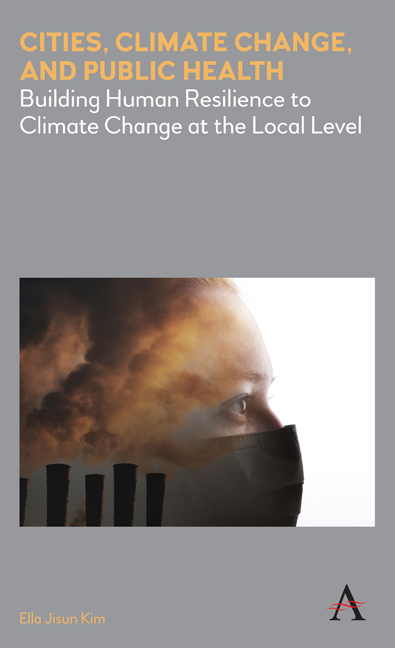 Cities, Climate Change, and Public Health
Cities, Climate Change, and Public Health Book contents
- Frontmatter
- Dedication
- Contents
- List of Figures and Tables
- Acknowledgments
- Chapter 1 Introduction
- Chapter 2 Cities, Climate Change, and Public Health
- Chapter 3 Collective Climate Adaptation at the Local Level
- Chapter 4 Framing Climate Change as a Public Health Issue
- Chapter 5 Role-Play Simulations
- Chapter 6 Digital Games
- Chapter 7 Role-Play Simulations versus Digital Games
- Chapter 8 Discussion and Policy Recommendations
- Appendix A Issue Framing Vignettes
- Appendix B Issue Framing Survey Questions
- Appendix C Role-Play Simulation Before-Survey Questions
- Appendix D Role-Play Simulation After-Survey Questions
- Appendix E Role-Play Simulation Facilitator Questionnaire
- Appendix F Role-Play Simulation Debriefing Script
- Appendix G Role-Play Simulation Post-Game Interview Questions
- Appendix H Role-Play Simulation Workshop Sample Characteristics
- Appendix I Digital Game Before-Survey Questions
- Appendix J Digital Game After-Survey Questions
- Appendix K Digital Game Post-Game Interview Questions
- Appendix L Digital Game Sample Characteristics
- References
- Index
Chapter 8 - Discussion and Policy Recommendations
Published online by Cambridge University Press: 06 May 2020
- Frontmatter
- Dedication
- Contents
- List of Figures and Tables
- Acknowledgments
- Chapter 1 Introduction
- Chapter 2 Cities, Climate Change, and Public Health
- Chapter 3 Collective Climate Adaptation at the Local Level
- Chapter 4 Framing Climate Change as a Public Health Issue
- Chapter 5 Role-Play Simulations
- Chapter 6 Digital Games
- Chapter 7 Role-Play Simulations versus Digital Games
- Chapter 8 Discussion and Policy Recommendations
- Appendix A Issue Framing Vignettes
- Appendix B Issue Framing Survey Questions
- Appendix C Role-Play Simulation Before-Survey Questions
- Appendix D Role-Play Simulation After-Survey Questions
- Appendix E Role-Play Simulation Facilitator Questionnaire
- Appendix F Role-Play Simulation Debriefing Script
- Appendix G Role-Play Simulation Post-Game Interview Questions
- Appendix H Role-Play Simulation Workshop Sample Characteristics
- Appendix I Digital Game Before-Survey Questions
- Appendix J Digital Game After-Survey Questions
- Appendix K Digital Game Post-Game Interview Questions
- Appendix L Digital Game Sample Characteristics
- References
- Index
Summary
Framing Climate Change as a Public Health Issue
Urban climate adaptation is often framed as protecting a city's physical assets from hazards and disasters. As a result, critiques have pointed out that adaptation plans rarely incorporate equity or social vulnerability, and calls have emerged for climate adaptation plans and policies to focus on building not just physical resilience but also human resilience to climate change (IPCC 2014; Hughes 2015).
In addition, cities have found that most publics in the United States do not find adapting to the changing climate to be a political priority (Howe et al. 2015), highlighting the importance of communicating the need for climate adaptation to elected officials and the public (Carmin et al. 2012; Howe et al. 2015; Shi et al. 2015). However, current public engagement practices are likely to be inadequate in fostering the technical and political learning necessary to collectively manage the climate risks that our cities face (Argyris and Schon 1978; de Suarez et al. 2012; Susskind 2001).
The Frames and Games project's survey experiment results show that framing climate change as a public health issue increases perceived knowledge of climate change, concern for local climate risks, and confidence in the local government's capacity to effectively manage climate risks. This indicates that cities have much to gain from framing climate change as a public health issue, as it boosts perceptions about the severity of the problem and builds commitment to policy action. In other words, a public health frame can be more powerful than an environment frame of climate change in motivating people to support climate adaptation plans and policies at the local level.
The public health frame of climate change also accentuates the potential of climate change to increase the prevalence of infectious diseases and other health problems that are already perceived as important, especially among the most vulnerable populations. Furthermore, according to interviews conducted as part of the project, the public health frame also heightens the geographic, temporal, and social proximity of climate impacts, corroborating previous research on the efficacy of the frame as a public education and engagement tool for climate planning and policymaking efforts (Frumkin et al. 2008; Maibach et al. 2010).
- Type
- Chapter
- Information
- Cities, Climate Change, and Public HealthBuilding Human Resilience to Climate Change at the Local Level, pp. 73 - 82Publisher: Anthem PressPrint publication year: 2020


